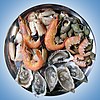Meat paradox
The meat paradox is the conflict between the facts that most people care about animals yet embrace diets that necessitate harming them.[1][2][3][4][5][6][7][8] Psychologists suggest that this conflict between beliefs and behavior leads to cognitive dissonance,[9][7][10][3] which they say meat-eaters relieve in several ways: by avoiding consideration of the provenance of animal products, and by ascribing reduced sentience, cognitive ability and moral standing to animals they regard as food.[11][2][3][5][12] Avoiding consideration of the provenance of animal products is another strategy.[5] Melanie Joy argues that this is why meat is rarely served with the animal's head or other intact body parts.[13]
Ascription of limited mental capacity

Psychologists argue that meat eaters reduce cognitive dissonance by minimizing their perception of animals as conscious and able to experience pain and suffering, particularly animals they regard as food.[5][7] This is a psychologically effective strategy, because organisms perceived as less able to suffer are considered to be of less moral concern, and therefore more acceptable as food.[1][14]
A 2010 study randomly assigned college students to eat beef jerky or cashews, then judge the moral relevance and cognitive abilities of a variety of animals. Compared with students who were given cashews, those who ate beef jerky expressed less moral concern for animals, and assigned cows a diminished ability to have mental states that entail the capacity to experience suffering.[2]
Studies in 2011 similarly found that people were more inclined to feel it was appropriate to kill animals for food when they perceived the animals as having diminished mental capacities; that, conversely, they perceived animals as having diminished mental capacities when told they were used as food; and, again, that eating meat caused participants to ascribe fewer mental abilities to animals. A separate study found that subjects who read a description of an exotic animal rated it as less sympathetic and less able to experience suffering if they were told that native people ate the animal.[1][5][15]
References
- ^ a b c Loughnan, Steve; Bastian, Brock; Haslam, Nick (2014). "The Psychology of Eating Animals", Current Directions in Psychological Science, 23(2), April, pp. 104–108. doi:10.1177/0963721414525781
- ^ a b c Loughnan, Steve; et al. (2010). "The role of meat consumption in the denial of moral status and mind to meat animals". Appetite. 55 (1): 156–159. doi:10.1016/j.appet.2010.05.043. PMID 20488214.
- ^ a b c Fawcett, Anne (2013). "Euthanasia and morally justifiable killing in a veterinary clinical context," in Jay Johnston, Fiona Probyn-Rapsey (eds.), Animal Death, Sydney: Sydney University Press, p. 215.
- ^ Loughnan, Steve; Bratanova, Boyka; Puvia, Elisa (2011). "The Meat Paradox: How Are We Able to Love Animals and Love Eating Animals?". In-Mind Italia, 1, pp. 15–18. "Meat eating is morally problematic because it contrasts our desire to avoid hurting animals with our appetite for their flesh. This tension – to love animals and to love meat – is the essence of the meat paradox."
- ^ a b c d e f Bastian, Brock; et al. (2011). "Don't mind meat? The denial of mind to animals used for human consumption" (PDF). Personality and Social Psychology Bulletin. 38 (2): 247–256. doi:10.1177/0146167211424291.
- ^ Bastian, Brock (23 March 2011). "The meat paradox: how we can love some animals and eat others", The Conversation.
- ^ a b c Rothgerber, Hank (August 2014). "Efforts to overcome vegetarian-induced dissonance among meat eaters". Appetite. 79: 32–41. doi:10.1016/j.appet.2014.04.003.
- ^ Hodson, Gordon (3 March 2014). "The Meat Paradox: Loving but Exploiting Animals", Psychology Today.
- ^ Piazza, Jared; et al. (August 2015). "Rationalizing meat consumption. The 4Ns". Appetite. 91: 114–128. doi:10.1016/j.appet.2015.04.011.
"How people defend eating meat", Lancaster University, 15 May 2015.
- ^ Hodson, Gordon (3 March 2014). "The Meat Paradox: Loving but Exploiting Animals", Psychology Today.
- ^ Loughnan, Steve; Bratanova, Boyka; Puvia, Elisa (2011). "The Meat Paradox: How Are We Able to Love Animals and Love Eating Animals?", In-Mind Italia, 1, pp. 15–18.
- ^ Presser, Lois (2013). Why We Harm, New Brunswick, NJ: Rutgers University Press, pp. 50–68.
- ^ Joy, Melanie (2011) [2009]. Why We Love Dogs, Eat Pigs, and Wear Cows: An Introduction to Carnism. Conari Press, p. 16. ISBN 1573245054.
- ^ Waytz, Adam; Gray, Kurt; Epley, Nicholas; Wegner, Daniel M. (2010). "Causes and consequences of mind perception" (PDF). Trends in Cognitive Sciences. 14 (8): 383–388. doi:10.1016/j.tics.2010.05.006.
- ^ Bratanova, Boyka; et al. (2011). "The effect of categorization as food on the perceived moral standing of animals". Appetite. 57 (1): 193–196. doi:10.1016/j.appet.2011.04.020. PMID 21569805.


